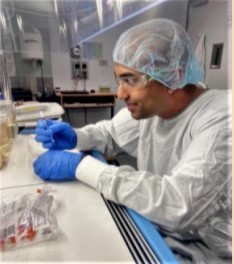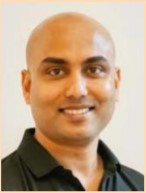Sri Lankan Scientist contributing to the COVID-19 Vaccine

Source:Dæhæna – Monthly e-Newsletter January 2021
Sri Lankan scientist Dr Danushka Kumara Wijesundara has been on the University of Queensland (UQ) team who were tasked to develop a coronavirus vaccine as a component of Australia’s response to target the COVID-19 pandemic. While it was unfortunate that the wide scale clinical trials of the vaccine were aborted, the contribution of the team to science and rapid vaccine development is undisputed.
Recently, Daehaena sat with Dr Wijesundara and discussed the challenges and joys of doing cutting edge research.
D: Where did you have your education and what experiences were you exposed to?
DW: After my primary school education in Sri Lanka, most of my secondary schooling and schooling in general was accomplished at The International School of Yangon (ISY), Myanmar when the country was under the rule of a military junta. During this time, Myanmar had limited access to the internet and the outside world which encouraged me to interact/make friends with locals from low-income dwellings who did not speak English or Sinhalese and in doing so I learned to speak the national (Burmese) language and to be satisfied with limited possessions. One of my fondest memories was playing football (soccer) in the rain, and in many cases using bare feet to kick footballs made of cheap (affordable to the locals) plastic. I am grateful for the life I experienced in Sri Lanka and Myanmar, being raised by loving parents and for the education I received at ISY, all of which were inspirational for me to be driven in the path of vaccine development.
I came to Australia to undertake a Bachelor of Biotechnology at the Australian National University (ANU), but it was during my honours year I started to perform ‘real-life’ research on immunity to viruses which is fundamental for developing rational vaccines to target viruses. Following this experience, as a PhD student at ANU and an early career fellow at the University of Adelaide, I was part of projects that resulted in the development of several vaccines for HIV, hepatitis C virus and Zika virus. This experience prepared me for the most challenging undertaking of my career thus far which is the expedited development of a coronavirus vaccine at UQ.
D: How did you get involved with the UQ Team developing the vaccine?
DW: I was made aware of an exciting research opportunity to develop protein vaccines in the quickest possible manner whilst attempting to maintain accuracy against emerging viruses with the potential to cause epidemics/
pandemics using the proprietary ‘Molecular Clamp’ vaccine technology. I got the job in May 2019 and at that stage we were optimising the vaccine development pipeline to make it function in the quickest possible manner using several viruses with no effective vaccines available to target them. I believed this job will provide me an once in a lifetime opportunity to get involved in vaccine development that one would be able to see from initial research to human clinical trials in a short period of time, which would otherwise take decades.
D: What are the challenges and excitements in working in this kind of project?

DW: The excitement is working at the cutting edge of vaccine technology and to develop a vaccine for human use at almost ‘record speed’. The biggest challenge is maintaining accuracy whilst vaccine development progresses at a very rapid speed. There are also high expectations from the public when you are at the forefront of vaccine development and the ambassadors of Australia’s vaccine response for COVID-19.
D: Are you disappointed that the project had to be abandoned?
DW: Disappointed of course. In science, many vaccines do not
complete the different phases of human clinical testing to ultimately be applied in the real world to benefit the general public. Although I believed we will get this opportunity with our vaccine, our trial as you are well aware was halted in the most unfortunate circumstances.
It is disappointing we could not progress the vaccine further because the data in the Phase I human study showed that the vaccine can evoke robust anti-viral and virus neutralising immune responses. Our goal now is to make alternative versions of the Molecular Clamp to avoid issues associated with HIV diagnostic interference.







